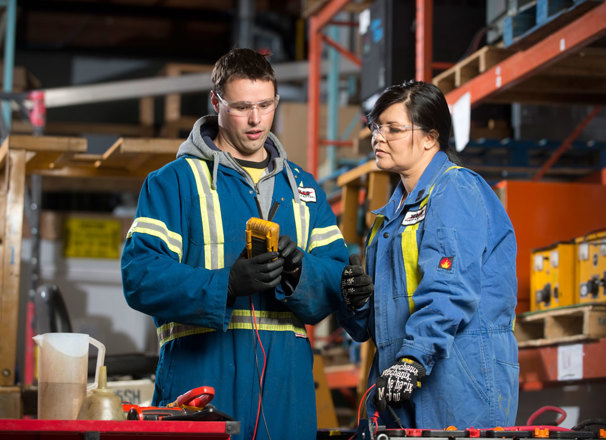In the knowledge sector, people use information to create something new, whether it’s a new or improved product, or a solution to an existing problem.
Your main asset in the knowledge economy is the ability to think outside the box and come at problems from different angles than everyone else.
One way to look at the knowledge economy is to compare it with other areas. For example, people working in manufacturing use their hands and physical tools to produce goods. Knowledge workers are more focused on creating ideas, concepts, and innovations.
The knowledge shift
Alberta’s knowledge economy includes advanced technology sectors such as clean energy and information and communications technology. It also includes areas such as life sciences, which focuses on the study of living things. These sectors are growing, with the number of Alberta businesses tripling in recent years.
All this activity means that Alberta is diversifying. Diversification is about relying on many sectors—both old and new—for growth.
The knowledge economy is good news for some oil and gas workers, because it can open up new career paths. The oil and gas industry uses state-of-the-art technologies, and workers familiar with these technologies may find other places to use their skills. Examples are jobs in research and development, data mining, and analytics. Alberta’s growing green economy could also provide oil and gas workers with new careers.
Innovation is key in the knowledge economy
Innovation is nothing new, but the term “innovation economy” has become common in recent years. Business leaders and scholars consider innovation to be the new force in modern capitalism. It is key to the success of the knowledge economy.
Innovation happens when creative people come up with new ideas and new ways to deal with business problems. Skip the Dishes is a good example. It gets food to people’s homes but doesn’t own any restaurants or delivery vehicles. Skip the Dishes innovated to find a new way of doing things.
The global marketplace
Innovative knowledge workers operate in a global marketplace where they need to be agile and adaptable. They must be able to:
- Connect in real time. Workers share information through constant networking.
- Adapt to rapid change. Slowing down for too long or failing to adapt is bad for business.
- Manage high consumer expectations. Clients demand personalized, high-performing products.
- Promote good values. Buyers want socially responsible products and services. Producing these often requires innovation.
- Embrace opportunity. Workers and companies that look forward to predict the “next big thing” are often ahead of the curve.
Working in the knowledge economy
The knowledge economy requires highly qualified people who are also agile and ready for whatever comes next. Companies use the ideas workers come up with to find ways to do things better.
Participating in the knowledge economy takes education, preparation, and perseverance. It is not something that can be done on a whim.
At the moment, the number of consultants, expert contractors, and online learning services is steadily rising in Alberta. This shows that the knowledge economy is thriving.
Knowledge economy jobs include:
- Software developers
- Engineers
- Physicians
- Scientists
- Lawyers
- Researchers
- Data scientists
- Data mining analysts
The knowledge economy needs educated people who:
- Have advanced skills and expertise
- Are motivated and mobile
- Embrace change
- Have strong problem-solving skills
- Have good judgment
If you want to be part of the knowledge economy, focus on:
- Education. Work is becoming more technical in all industries and roles. Education is more important than ever across broad sectors and in specific jobs.
- Job skills. Employers need people with math and information technology skills.
- Core skills. You need to know how to solve problems, communicate, and work with others. You need to be flexible, creative, and agile. You should be open minded and have a global view.
- Lifelong learning. If you stay still for too long, you’ll fall behind. Seek out on-the-job training and upgrade your skills often.
- Entrepreneurial skills. The knowledge economy needs innovators with a strong business sense.
These skills are valued in the knowledge economy. But more and more, they are also needed in all industries and jobs. In a changing economy, it’s a good idea to work on them to keep your skills up to date.
Alberta has a highly educated and skilled workforce, with an ever-expanding knowledge economy. Explore it now to see what types of opportunities may be out there waiting for you!


